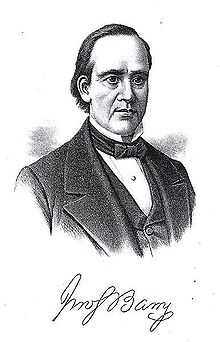John S. Barry
| John S. Barry | |
|---|---|
 | |
| 4th Governor of Michigan | |
| In office January 3, 1842 – January 5, 1846 | |
| Lieutenant | Origen D. Richardson |
| Preceded by | J. Wright Gordon |
| Succeeded by | Alpheus Felch |
| 8th Governor of Michigan | |
| In office January 7, 1850 – January 1, 1852 | |
| Lieutenant | William M. Fenton |
| Preceded by | Epaphroditus Ransom |
| Succeeded by | Robert McClelland |
| Personal details | |
| Born | January 29, 1802 Amherst, New Hampshire |
| Died | January 14, 1870 (aged 67) Constantine, Michigan |
| Political party | Democratic |
| Spouse(s) | Mary Kidder |
For the American businessman John S. Barry, see John Barry (WD-40).
John Stewart Barry (January 29, 1802– January 14, 1870) was the fourth and eighth Governor of the U.S. state of Michigan. He was Michigan's only three-term governor in the 19th century. His main accomplishment was bringing the state out of bankruptcy after the Panic of 1837.
Early life in New Hampshire and Vermont
Barry was born in Amherst, New Hampshire to John and Ellen (Steward) Barry.[1] While he was young, the family moved to Rockingham, Vermont where he worked on his father's farm and received an education in the local schools. He married Mary Kidder, of Grafton, Vermont, and in 1824 went to Georgia, Vermont, where he taught school while studying law. He began to practice law, and while in Georgia he was also a member of the Governor’s staff.
Life and politics in Michigan
In 1831, he moved to White Pigeon, Michigan where he became a merchant and was active in politics. In 1834, Barry moved to Constantine, Michigan and opened a general store in that village's first frame-built building. He became Justice of the Peace in 1831 while in White Pigeon and continued until 1835. Barry was a prominent participant from the 13th district in the 1835 convention that drafted Michigan's first constitution.
When Michigan became a state of the Union in 1837, Barry was a State Senator (1836, 1840) and was recognized as a leader of the state Democratic party. In 1840, Barry became deeply interested in the cultivation of the sugar beet and visited Europe to obtain information in reference to its culture.
4th and 8th Governor of Michigan
He was selected by the Democratic Party to run for Governor in 1841. He won that election and was reelected in 1843.
During Barry's first term, the University of Michigan first opened for students in 1841 in Ann Arbor after moving there from Detroit. The Michigan Central and Michigan Southern Railroads greatly expanded. In 1845, at the end of his second term, the population of the state was more than 300,000.
After a hiatus, the popular Barry was again elected Governor in 1849, serving from 1850 to 1852, becoming the first Michigan Governor to serve non-consecutive terms. During Barry’s third term the Normal School (now Eastern Michigan University) was established in Ypsilanti. A new state constitution was adopted in 1850. He was defeated in 1853 and again ran unsuccessfully in 1859.
He also ran unsuccessfully to be a U.S. Representative from Michigan’s 2nd congressional district in 1856 against Republican Henry Waldron.
Throughout his career, he was a supporter of the Wilmot Proviso, intended to stop the spread of slavery, but he remained a member of the Democratic Party, becoming sympathetic with the "ultra" wing during the Civil War. He was a delegate to the Democratic National Conventions of 1856 and 1864.
Retirement and death
Barry retired to private life after the beginning of the ascendancy of the Republican party during Reconstruction, and carried on his mercantile business at Constantine. He died just two weeks before his sixty-eighth birthday, his wife's death having occurred a year previous, on March 30. They left no children.
Barry's home in Constantine, the Governor John S. Barry House, has been listed on the National Register of Historic Places since 1972.[2][3]
References
- ↑ PORTRAIT AND BIOGRAPHICAL ALBUM OF Barry and Eaton Counties, Mich.. 1891. p. 113.
- ↑ "Gov. John S. Barry House, Constantine". Go HIstoric. Retrieved January 19, 2014.
- ↑ "The History of St. Joseph County, Michigan". Southwest Michigan Business & Tourism Drectory. Retrieved January 19, 2014.
External links
| Wikimedia Commons has media related to John S. Barry. |
- Biographical Portrait from 1892 Portrait & Biographical Album of Genesee, Lapeer & Tuscola Counties, Chapman Bros.
- The Political Graveyard
- National Governors Association
| Political offices | ||
|---|---|---|
| Preceded by J. Wright Gordon |
Governor of Michigan 1842–1846 |
Succeeded by Alpheus Felch |
| Preceded by Epaphroditus Ransom |
Governor of Michigan 1850–1852 |
Succeeded by Robert McClelland |
|

